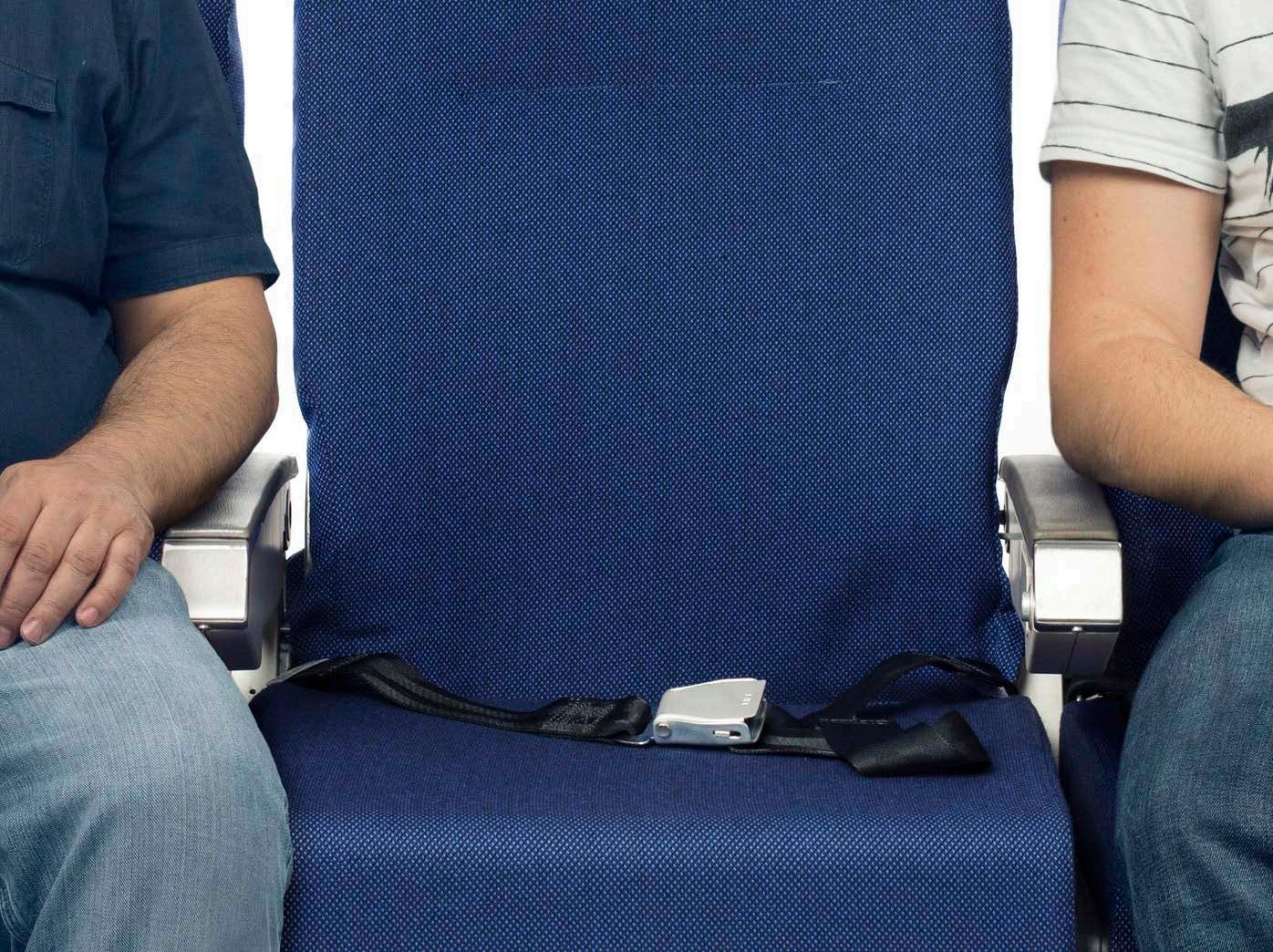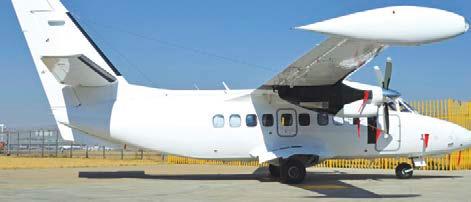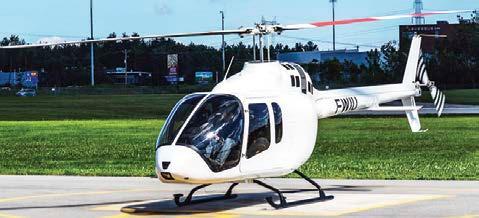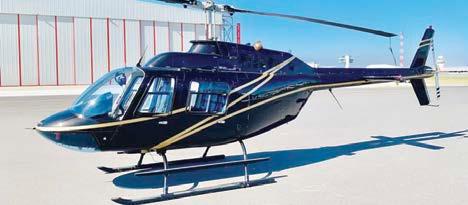
9 minute read
Airline Morality - Dassie Persaud-van der Westhuizen
Dassie Persau -van er Westhuizen
AIRLINE MORALITY DURING COVID-19:
Advertisement
Airlines are considering neutralising the middle seat to reduce the risk of infection.
Are you a ‘good’ person? To those of you uncomfortably recalling your actions and feeling the weight of a guilty conscience, like after eating the last slice of cake: take a deep breath and relax. The answer isn’t black and white, even if we may wish it to be.
VASTLY different ideas exist about what constitutes being ‘good’ and ‘bad’. It’s about moral philosophy, also known as ethics.
Our behaviour is often linked to our circumstances. Instead of only theorising about moral philosophy in hypothetical situations, the Covid-19 crisis has reminded us that humans are neither inherently good, nor evil. We have the capacity to be both. Each of us should assess on which side of the morality spectrum we would like to fall during these trying times.
As juristic persons, with many of the rights that natural persons have, the same holds true for businesses. Displaying admirable qualities through Corporate Social Responsibility (CSR) programmes during good times is easy. What sets businesses apart are their morals while navigating difficulties in a way that maintains public trust through ethical practices. CEO’s will tell you that doing so is essential for long term success. This is because pure hard-line capitalism has proven unsustainable in times of crisis. The United Nations Global Compact details that businesses should be good corporate citizens. Gone are the days where “the business of business is business.”
CSR is a twofold concept: it considers what happens within, as well as outside, the business. Internally, it includes paying employees decent wages and creating safe and enabling working conditions. Externally, it involves social contributions and minimising adverse environmental impact.
The aviation industry has no shortage of impressive CSR projects during periods of economic growth: Some airlines (like EasyJet) focus on gender wage parity and diversifying the human capital pool by providing scholarships to women. IndiGo (a low-cost Indian airline) goes further by actively enabling women to balance work and family by providing day care facilities at the workplace. Others raise and donate funds to partner organisations that provide healthcare to underprivileged children.
The aviation industry’s initiatives aimed at addressing climate change are particularly fascinating. Interim measures (by airlines
such as British Airways) involve offsetting carbon emissions - every tonne of CO2 omitted from fuel is compensated for by reducing a tonne of the same from the air, by planting trees or supporting rain forest preservation efforts. Long term goals aim at reducing carbon emissions by introducing fuel efficient aircraft into the fleet. The Airbus A320 is a prime example of this – the new engine option (NEO), when coupled with wingtip ‘sharklets’, is 15-20% more fuel efficient than the current engine option (CEO). The NEO is also quieter, creating less noise pollution, especially when combined with airlines implementing continuous descent approaches.
These initiatives are laudable. But what happens when economies crash, like our current reality in COVID-19? This crisis has exposed those who are passionate about social responsibility and those less so. Is it ethical, for example, to do as the following aviation players have done: • A handful of private airport operators in Asia attempted to maintain profits by charging higher levies. IATA stepped in to remind the industry to maintain high business and ethical practices during the pandemic. • A European airline ‘withdrew’ cadet pilot’s contracts (who had self-funded their training) the day before paying out £174m to shareholders, instead of placing the cadets on unpaid leave like the rest of the crew. £60m went into the airline founder’s pockets. Do their successful CSR practices during the periods of economic growth outweigh these questionable actions during times of crises? • Some airlines have, so far, decided not to refund tickets for cancelled flights. A law firm is currently threatening legal action against major European carriers as a result of this. Maybe passengers should use their experiences (whether positive of negative), while trying to get reimbursed for cancelled flights, as an opportunity to be more conscious
about the carriers they support in future? • Those airlines, who failed to build strong balance sheets, are requesting government bailouts. Governments have, and will continue to, rescue some. Contrary to what one might think, airlines incur massive daily expenses while their fleet is grounded. These include parking fees and maintenance expenses – aircraft wheels are rotated every two weeks, hydraulic fluid is applied regularly to the landing gear to avoid rust, measures are taken to prevent birds nesting in gaps, batteries are reconnected bimonthly, and the engines are started during the bigger monthly inspections. Current employees might view this as hope for their future aviation careers. I wonder how taxpayers will feel if their taxes go towards bailouts for industry players with poor CSR programmes.
While it is tempting to harden one’s heart to act with a ‘cut throat’ attitude for survival, airlines should consider the long term benefits of treating their stakeholders with respect and dignity – for internal morale, employee commitment and their brand reputation. After all, the world is facing a humanitarian crisis. And the aviation industry provides jobs for 65 million workers globally – all of whom are affected by the travel bans.
Although businesses are expected to act responsibly, they are not charities; and will necessarily require some compromise from their employees. Provided we don’t take advantage of each other, Covid-19 could be survivable. Some airlines have already shown that the desired results could be achievable while acting humanely: • After announcing that layoffs are inevitable, United Airlines provided incentives for crew to quit their jobs or take early retirement. These include five years of active employee travel benefits, receiving top tier status plus 250,000 miles and priority for job vacancies, should they wish to return in the future.
Airlines need to respond with moral authority ahead of profits to the Covid-19 pandemic.

A middle eastern airline – who is known for their stringent style and cabin crew standards – has set these aside in favour of preserving crew’s health while working: They created disposable plastic covers to be worn over their uniforms for extra protection. Brussels Airlines pilots have written an open letter proposing pay cuts by 45% for reduced working hours until 2023, in an attempt to prevent job losses. Given the state of the industry, they noted that retrenched crew will struggle to find similar jobs in aviation for years, so it is best for all employees to find a way to get through the crises together. “This way, Brussels Airlines will avoid €22 million in severance pay to the 191 pilots. In total, and until 2023, the airline will save up to €100 million in wages,” they explained.
This shows that we all have a part to play in adjusting to the pandemic.
No one in this industry will walk away unscathed. And if the individual players in the aviation industry are sincere with their CSR, they should perhaps seize the opportunity that COVID-19 opens for them to substantively embrace the African notion of Ubuntu (“I am because we are” or “humanity towards others”). This would mean the treatment of their suppliers, employees, passengers and other stakeholders on the basis of people, then planet and lastly profit morality. If the airline industry achieves this, one could proudly say that its players are indeed ‘good’ people.

AIRLINES WILL FACE LOSS MAKING LOADS WHEN THEY RETURN TO FLIGHT.

2005 Hawker 400XP
> 1,592 Hours Since New > 1,457 Cycles Since New > Dual Collins FMS-5000 Flight Management
Systems with Integrated Collins GPS-4000A
Global Positioning System > Collins TCAS-4000 Traffic Alert and Collision
Avoidance System with Change 7.1 Software > Honeywell Mark V Terrain Awareness and Warning
System with Wind Sheer Detection
Enquire
2 x Beechcraft 1900D Airliners
> Low Airframe, Engine and Propeller Hours > Honeywell CAS-67B TCAS II with Change 7.1
Software Upgrade > Collins APS-65H Autopilot System > Collins WXP-850B Weather Radar > Honeywell Mark VI EGPWS System > EASA Compliant
$2,650,000 Excluding VAT Per Aircraft

2 x LET410 UVP E20’s
> Low Airframe, Engine and Propeller Hours > Dual Nav/Com/GPS Systems > Dual Transponders > Weather Radar > Autopilot System > Enhanced Ground Proximity Warning System > One Owner Since New File photo

Inviting Offers

2011 Quest Kodiak
> 2,242.7 Hours Since New > Garmin G1000 Avionics Suite > S-Tec 55 Autopilot System > Integrated Class B TAWS Terrain Awareness and
Warning System > Garmin GTS-800 Traffic Awareness System > Ten Place Interior > Cargo Pod > Air Conditioning
$1,150,000 Excluding VAT
2009 Piper Matrix
> 540 Hours Since New > Avidyne Entegra Release 9 Avionics Suite > Avidyne TWX-670 Tactical Weather Detection
System > Avidyne DFC-100 Autopilot > Avidyne IFD-5000 Primary/Multi-Function Display > Avidyne TAS-610 Dual Antenna Management System > Air Conditioning > Speed Brakes
$450,000 Excluding VAT


2013 Cirrus SR22T G5 GTX
> 730 Hours Since New > Cirrus Garmin Perspective+ Avionics Suite > BF Goodrich WX-500 Stormscope > Garmin GFC-700 Autopilot/Flight Director System with Yaw Damper and Electronic Stability Protection > Garmin 12” Primary Flight Display/Multi-Function
Display Systems > Skywatch Traffic Advisory System > SurfaceWatch Aircraft Position Monitoring System
$575,000 Excluding VAT 2008 Cirrus SR22-G3
> 585 Hours Since New > Dual GNS-430 Nav/Com/GPS > EMax Engine Monitoring System > BF Goodrich WX-500 Stormscope > GTX-330 Mode S Transponder > Honeywell TAWS KGP-560 > Avidyne FlightMax Multi Function Display > S-Tec 55X Autopilot > 406 MHz Emergency Locator Transmitter
R4,700,000 Excluding VAT
NEW 2019 Bell 505 Jetranger X
> Garmin G1000H Avionics Suite > Transponder with Mode S and ADS-B (Out)
Enabled > Engine Indication and Crew Alerting System > Fuel Flow Indication with Range Ring Display > Second VHF Transceiver (Pedestal Mount) > Inlet Barrier Filter > Air Conditioning > Dual Pilot Controls
Inviting Offers
File photo


1999 Bell 206B III Jetranger
> 1,436 Hours Since New > Main Rotor Blades: 340 Hours Since New > Dual Garmin GNS-430 Nav/Com/GPS > King KT-76C Transponder > King KCS-55A Slaved Compass with Horizontal
Situation Indicator > High Skid Gear with Flitesteps > Nightscanner Searchlight
Inviting Offers
Contact our Sales Professionals for more information
Johannesburg: Agnes Phillips 082 893 3399 agnes.phillips@nac.co.za Durban: Colin Fletcher 082 893 6031 colin.fletcher@nac.co.za Johannesburg: Janco Loubser 082 854 2520 janco.loubser@nac.co.za Johannesburg: Marna Marais 082 434 3097 marna.marais@nac.co.za Johannesburg: Rikus Rautenbach 084 313 5675 rikus.rautenbach@nac.co.za
2013 Robinson R44 Raven II
> 840 Hours Since New > Garmin GNC-420W Com/GPS > King KY-196A Com > Garmin GTX-327 Transponder > Nine Hole Instrument Panel > Attitude Indicator > Turn and Slip Indicator > Air Conditioning
R4,900,000 Excluding VAT

National Airways Corporation Head Office
+27 11 267 5000 aircraftsales@nac.co.za www.nac.co.za









